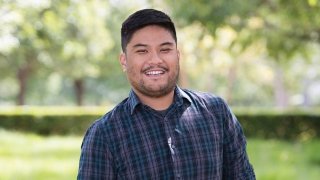DOWNLOADING CALM
Recently, J.B. Bunyi MFT ’16 faced a common situation for a school therapist trainee: A young client was extremely anxious but could not be motivated to learn more about deep breathing and guided meditation.
“I felt those skills would really help him relax,” Bunyi says. “But like so many other kids, he felt he’d tried those in the past and they’d never worked.”
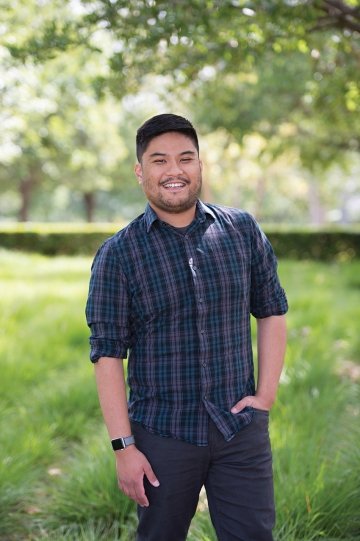
Not long after that conversation, Bunyi was shopping at Best Buy and walked past a display of cheap virtual reality headsets. He wondered if, by adding a cutting-edge graphical interface to his guided meditation sessions, he might be able to get the young client interested in trying meditation again.
“I figured, if I thought this was cool, maybe the kid would, too,” Bunyi says.
Bunyi was surprised by just how well the VR headset worked in practice. With his client wearing the headset, Bunyi led a guided meditation verbally, using his own script—while the child was treated to a visual 3-D tour of an otherworldly landscape, provided by a commercially available relaxation app. Afterward, “you could notice, his body had relaxed, and his voice and posture,” Bunyi says. “He jogged back to his class. He kind of skipped.”
Bunyi is also at work on an app called Fubelo, which aims to disrupt the functional behavior analysis (FBA), a write-up used by mental health professionals to paint a picture of why a student is exhibiting certain behaviors. The FBA often draws its data from just one episode or encounter, while Fubelo would create a more well-rounded picture by allowing input from teachers, parents and administrators.
Bunyi recently started a position as a digital mental health specialist at UC Irvine and PsyberGuide.org, a project of One Mind, where he’ll be helping to research, vet and review mental health apps to inform and empower consumers. “I find it very exciting,” he says, “the hope that tech can bring to the field, in terms of accessibility and lessening stigma.”
MOBILE TEACHER
Katherine Guevara has worked, volunteered and traveled in 70 countries but somehow keeps finding her way back to USC, where she’s earned a BA ’02, an MS ’04 and a DPPD ’15, and is an instructional designer at the USC Center for Excellence in Teaching as well as an assistant adjunct faculty member in the MAT–TESOL program.
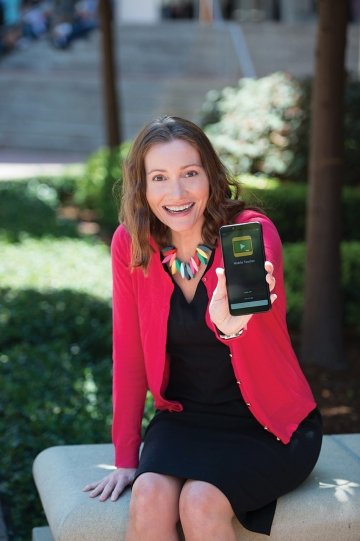
Experiencing firsthand teachers’ need and desire for professional development, Guevara has made it her mission to help provide resources and training for and by teachers in developing countries and regions around the globe—what she prefers to call the “majority world.”
“If tech could be used for teaching English, then what about for training teachers? I realized the power of simple, ubiquitous technology: teachers’ phones,” she explains. “A solution for when training wasn’t available at all, or it was not accessible, or it was offered by someone who might have inappropriate context.”
With help from students in Jeffrey Miller’s capstone undergraduate computer science class at USC, Guevara has built an app called Mobile Teacher (mobileteacher.org) to provide a global platform for teachers to share successful strategies.
Videos on Mobile Teacher, which is designed to work offline for educators who have irregular access to the internet, are created by users themselves.
“What would a foreign expert know about teaching without electricity in a cinderblock, open-space classroom with 100 students?” she asks. “Probably not much. But a local teacher working in that reality might have a great idea and should be recognized for that expertise.”
Launched this year, Mobile Teacher already features submissions from teachers in Peru, Mauritius, Kazakhstan, Nepal and Algeria.
This summer, Guevara was selected to lead a Mobile Teacher project in Ecuador with grant funding from the U.S. Department of State English Language Fellow Program. She helped get the app off the ground in remote Afro-Ecuadorian, Quechua-speaking and Galapagos Islands locales before returning to USC.
EXPERIENCE MEETS INNOVATION
When it comes to organizational change and innovation, leveraging technology and using storytelling to close the gap can go a long way.
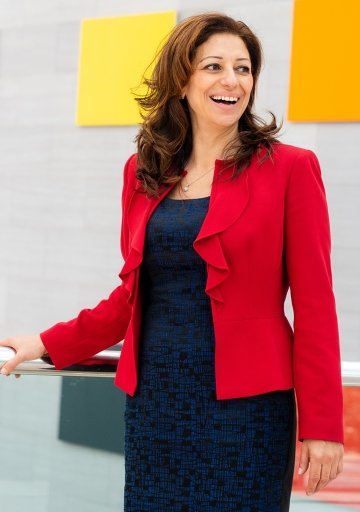
Just ask Marina Theodotou EdD ’18, learning support faculty at the Defense Acquisition University (DAU), a U.S. Department of Defense (DoD) institution.
Recently, she led an enterprise-wide pilot testing an artificial intelligence/adaptive learning technology against a more traditional, PowerPoint-based learning module.
“The control group couldn’t remember what they’d learned. They were just clicking through,” she says. “The test group using the AI-powered module engaged better and retained knowledge longer.”
Another culture-change project Theodotou has spearheaded uses the ancient art of storytelling: TEDxDAU, the first TEDx initiative at DAU.
Coordinating 12 experts from across the DoD and industry, Theodotou oversaw training for a speaker boot camp, where participants harnessed the power of technology to best deliver their presentations as inspirational and engaging storytelling.
“Implementing change in learning requires knowledge, motivation and the organizational infrastructure to explore both cutting-edge technologies like artificial intelligence as well as century-old traditions like storytelling,” Theodotou says. “By complementing our critical thinking and creativity through old analog skills with the new exponential digital capabilities, we reveal our decisive edge.”
THE RULES OF THE GAME
ANNA HUERTA ’09 ME ’10 grew up on video games.
Computer and console games were how she bonded with her four brothers, how she mastered basic knowledge areas as a kid and even how she studied in high school.
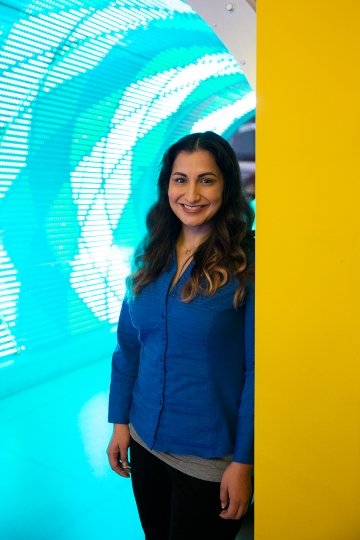
“I’d take AP classes,” she remembers, “and I’d look for games to practice what I learned, so I could recall the information better.”
When she went to college, Huerta was accepted into the first-ever Interactive Media & Games Division freshman class at USC. She interned with the Institute of Creative Technologies, helping explore the implementation of virtual and augmented reality environments in occupational therapy for war veterans afflicted with post-traumatic stress. She also designed a therapy project called Breath, a game that helped players complete their post-operation exercises by syncing their breathing velocity to the movements of an on-screen flying phoenix avatar.
Later, at USC Rossier, she studied psychology and instructional design, the key concepts of which, she says, “match up one-to-one” with the world of user experience design.
“That degree is the foundation for what I’m doing now,” Huerta says. “The program taught me how to do human-centered design.”
Today, Huerta is a lead commercial game designer at Zynga, where she focuses on the link between gaming and learning.
Zynga is perhaps best known for FarmVille, a blockbuster game made popular on Facebook about a decade ago. To date, more than 1 billion people have played Zynga’s games, including CSR Racing 2, Empires & Puzzles, Merge Dragons! and Words with Friends.
These days, Huerta’s big project is working on Zynga Poker. Her role is to manage their creative team and help develop new feature offerings through human-centered design.
Huerta would like to see more education and psychology degree-holders in the video game industry. She thinks it might help companies, currently dominated by MBA-holders, build better games.
“People don’t consider education degrees in terms of tech,” she says. “I wish they did. The bottom line of an MBA is money. For education and psychology, the bottom line is people.”

